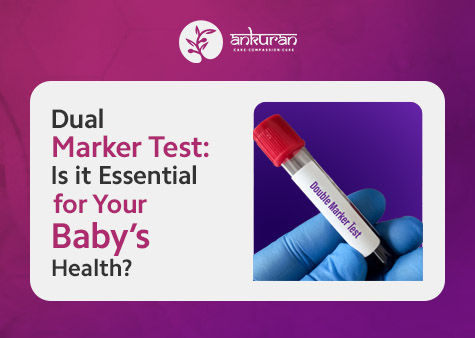Pregnancy is a journey filled with joy, anticipation, and many important decisions for your baby’s well-being. One such decision is whether to opt for the dual test in pregnancy. This screening test, done during the early weeks, helps identify the risk of chromosomal abnormalities in the baby, such as Down syndrome, Edwards syndrome, or Patau syndrome. At Ankuran Clinic, we understand that expecting parents want the best for their little one, and making informed choices is a big part of that process.
What Is the Dual Test in Pregnancy For?
The dual test in pregnancy—also known as the double marker test—is a prenatal screening done in the first trimester. It measures two important substances in the mother’s blood:
- Free Beta hCG
- Pregnancy-Associated Plasma Protein-A (PAPP-A)
When combined with the results of an ultrasound scan (NT scan), this test can provide an accurate risk assessment for chromosomal conditions. The dual marker test is safe, non-invasive, and only requires a simple blood sample.
When Is a Dual Test Performed?
The dual test in pregnancy is usually performed between the 11th and 14th week. This timing ensures the results are accurate and can be effectively combined with the NT scan. If delayed beyond this window, you might have to consider other screening options in the second trimester.
Read More:
What Is the Price of a Dual Marker Test?
One common question, expecting parents always have, is about the double marker test price. While the cost varies by location and facility, it’s generally affordable compared to more advanced genetic tests. At Ankuran Clinic, we maintain transparent pricing so you know exactly what you’re paying for.
If you’re searching for a dual marker test near me, we ensure easy access and professional care. You can also opt for a double marker test book online option for added convenience. This saves time and ensures your appointment is scheduled according to your preferred date.
Average dual marker test cost in most cities ranges between ₹1,500 and ₹3,500, though prices may vary. For accurate pricing, feel free to contact us directly.
Why is the Dual Marker Test Important in Prenatal Care?
The dual marker blood test gives you valuable information early in pregnancy, allowing your doctor to plan any further diagnostic steps if needed. Remember, this is not a diagnostic test but a screening tool that helps identify whether your baby is at increased risk. While not compulsory for all pregnant women, the 1st trimester dual marker test is strongly recommended for those:
- Above the age of 35
- With a family history of genetic disorders
- Having abnormal ultrasound results
- Who have had previous pregnancy complications
Get a Complete Risk Assessment
Book Your Dual Marker Test Now
Is Dual Marker Test Compulsory?
The dual test in pregnancy is not legally compulsory, but doctors highly recommend it for early detection of chromosomal conditions such as Down syndrome, Edwards syndrome, or Patau syndrome. The dual marker test is especially important for women above 35, those with a family history of genetic conditions, or pregnancies showing abnormal ultrasound results. While optional, it is a safe, simple, and non-invasive way to assess your baby’s risk factors early in the first trimester.
Can the Dual Marker Test Detect Autism?
No, the dual marker test cannot directly detect autism. This test is mainly used to screen for chromosomal abnormalities such as Down syndrome, Trisomy 18, and Trisomy 13—conditions that may lead to developmental delays or intellectual disabilities. Although certain genetic forms of autism can be identified through detailed chromosomal analysis, the dual test in pregnancy and double marker test are not designed for diagnosing autism spectrum disorder. Autism is a neurodevelopmental condition for which no specific prenatal screening currently exists. The dual marker blood test focuses on measuring Free Beta hCG and PAPP-A—biomarkers linked to chromosomal conditions, not neurodevelopmental disorders.
How To Check Dual Marker Report?
Once you take the blood test for double marker, the report will show levels of Free Beta hCG and PAPP-A, along with a calculated risk ratio. Your doctor will interpret whether the values indicate a low or high risk for chromosomal abnormalities.
Is A Double Marker Test 100% Accurate?
No, the double marker test is not 100% accurate—it’s a screening tool, not a diagnostic one. While it has a high detection rate when combined with an NT scan, there is still a small possibility of false positives or negatives. This is why doctors may recommend follow-up tests if the results suggest a higher risk. The 1st trimester dual marker test provides strong indications, but confirmatory tests like amniocentesis are needed for a definite diagnosis.
What If a Double Marker Test Is Positive?
If your double marker test result is positive, it means there is a higher-than-average risk for certain chromosomal conditions. It does not confirm a problem with your baby. In such cases, your doctor may suggest additional tests such as Non-Invasive Prenatal Testing (NIPT) or diagnostic procedures.
What Is PAPP-A Normal Range?
PAPP-A (Pregnancy-Associated Plasma Protein-A) is one of the two key markers measured in the dual test in pregnancy. While exact reference values may vary between laboratories, the general ranges are:
- Normal Range: ≥ 0.5 MoM (Multiples of Median) for your gestational age
- Low Range: < 0.5 MoM, which may be associated with an increased risk of chromosomal abnormalities such as Down syndrome, Trisomy 18, or complications like preeclampsia and restricted fetal growth.
- Higher Range: > 2.5 MoM, which is less common but can sometimes be linked to multiple pregnancies or other maternal-fetal factors.
It’s important to understand that PAPP-A levels are only one part of the bigger picture when assessing pregnancy health. Your doctor will review these results alongside other test findings and may recommend additional screenings if necessary.
What Is the Difference Between NT Scan and Double Marker Test?
The full form of NT scan is Nuchal Translucency scan. It is a prenatal ultrasound performed during the first trimester of pregnancy to assess the risk of certain chromosomal abnormalities in the fetus, such as Down syndrome (Trisomy 21), Edwards syndrome (Trisomy 18), and Patau syndrome (Trisomy 13). The scan measures the fluid-filled space at the back of the baby’s neck, known as the nuchal translucency. An increased measurement can indicate a higher risk of these conditions.
In contrast, the double marker test is a blood test that evaluates two biochemical markers in the mother’s blood:
- Free Beta hCG (human chorionic gonadotropin)
- PAPP-A (Pregnancy-Associated Plasma Protein-A)
These markers help identify potential chromosomal abnormalities. While the NT scan gives structural and physical measurements through imaging, the dual marker test provides biochemical data.
NT Scan vs. Dual Marker Test: Do You Need Both?
Yes, both tests are recommended together for the most accurate screening in early pregnancy. The NT scan provides structural measurements, while the dual marker test gives biochemical data. When combined, the NT scan and the dual test in pregnancy offer a more accurate and comprehensive risk assessment. This pairing ensures that both physical markers (measured through ultrasound) and biochemical markers (evaluated through a blood test) are considered, giving your doctor a clearer and more reliable picture of your baby’s health.
Is There Any Treatment After a Double Marker Test?
There is no direct “treatment” for an abnormal double marker test result, as it is a screening tool. If the test suggests a higher risk, the next step is further investigation through advanced genetic tests. The focus is on confirming whether a condition exists and then planning care accordingly. This a comprehensive table that shows range of test related chromosomal abonormalities:
| Test | Timing (Gestational Age) | Method | Blood/Hormone Components Measured | Conditions Screened | Accuracy |
| Dual Marker Test | 11–14 weeks | Blood test + NT scan | Free Beta hCG, PAPP-A | Down syndrome, Trisomy 18 | Moderate |
| Triple Marker Test | 15–20 weeks | Blood test | AFP, hCG, Estriol | Neural tube defects, Down syndrome | Moderate |
| Quadruple Marker Test | 15–20 weeks | Blood test | AFP, hCG, Estriol, Inhibin-A | Down syndrome, Trisomy 18, Neural tube defects | High |
| Non-Invasive Prenatal Testing (NIPT) | ≥ 10 weeks | Blood test | Cell-free fetal DNA (cffDNA) | Multiple chromosomal abnormalities | Very High |
Final Takeaway
The dual test in pregnancy is more than just a medical screening—it’s a gentle step toward protecting the little life growing inside you. By identifying potential risks early, it gives you the gift of time, reassurance, and the power to prepare. If you’re looking for a dual marker test near saltlake kolkata, curious about the dual marker test cost, Ankuran Clinic is here to walk beside you. With compassionate guidance, transparent care, and advanced technology, we ensure that both you and your baby feel supported at every milestone. Because at Ankuran, every heartbeat matters.
FAQ
Is a Double Marker Test Painful?
No, the double marker test is not painful. It is a simple blood test, similar to any routine blood draw, and may cause only mild discomfort at the needle site.
What Is Age Risk in a Double Marker Test?
The risk of chromosomal abnormalities, such as Down syndrome, increases with maternal age—particularly after 35 years.
Does the Double Marker Test Reveal Baby Gender?
No, the double marker test does not reveal the baby’s gender. It is designed to evaluate specific hormonal markers in the mother’s blood to assess the risk of certain chromosomal conditions.



No Comments